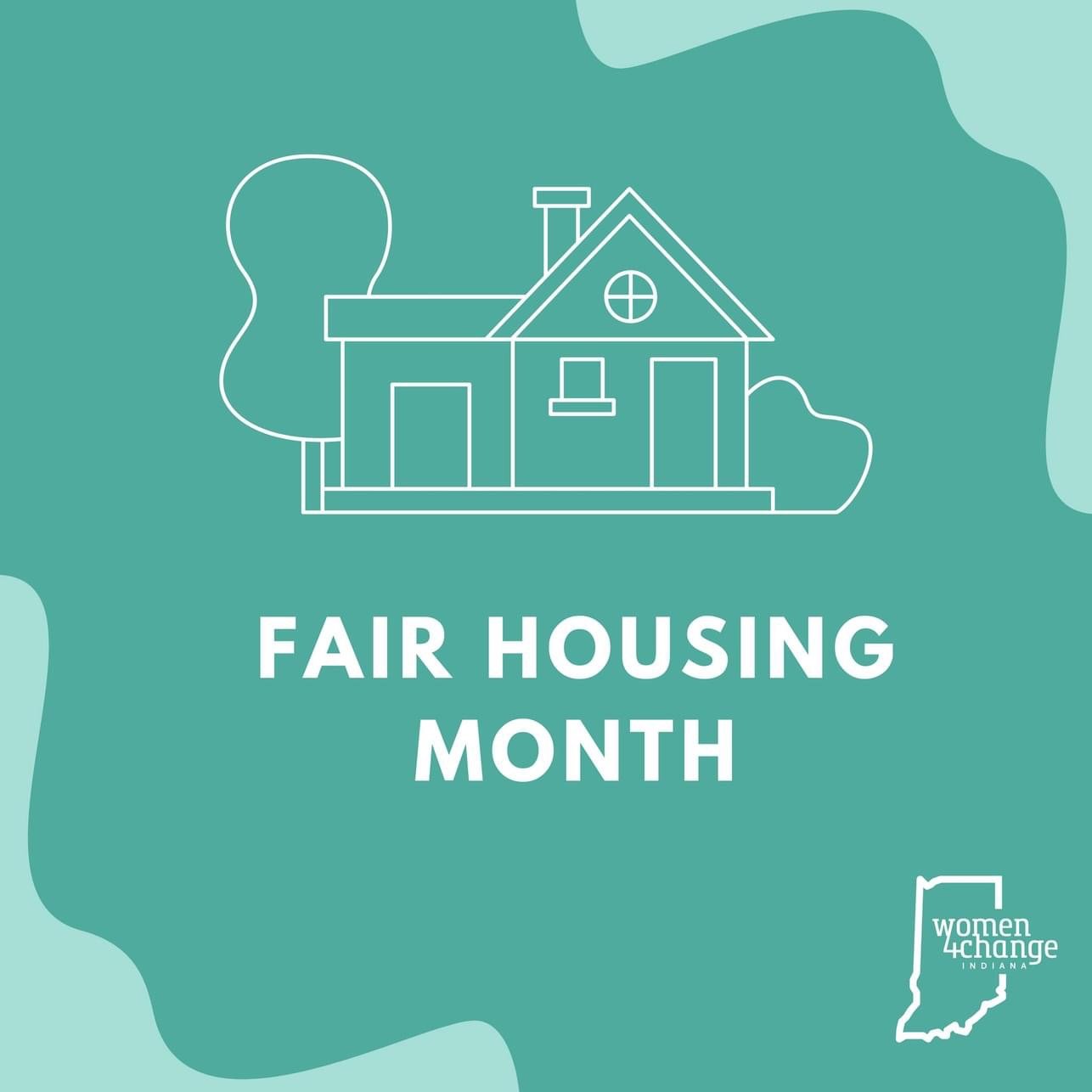Fair Housing Month in Indiana: An imbalance of bank and landlord protections lead to fewer rights for renters
Fair Housing Month in Indiana: An imbalance of landlord protections leads to fewer rights for renters
Claire Farrington and Aimee West
Fair Housing Month
Claire Farrington
Fair Housing Month aims to advance equitable opportunities in housing and commemorates the passing of the Fair Housing Act (National Association of Realtors, 2024). This year marks the 56th anniversary of the Fair Housing Act enacted on April 11, 1968. The Fair Housing Act protects individuals from discrimination in buying, selling, or renting houses. And yet, many Hoosiers fail to benefit from these protections– especially tenants.
Indiana is one of only a few states that does not allow rent escrow or rent withholding when landlords fail to meet their contractual obligations to keep rental units habitable. This means tenants are forced to pay rent even when living in unacceptable conditions, like houses with broken windows, collapsing ceilings, or inoperative heating. In addition, Indianapolis has the second-highest number of evictions of any city in the United States, surpassed only by New York (Spiegel, 2023). To be clear, this isn’t the rate of evictions per capita, it is the total number of evictions.
Unsurprisingly, like many other social issues, women, people of color, and immigrants are disproportionately affected by the housing crisis and are overrepresented in these eviction numbers. Low-income households also suffer. According to AXIOS, rent for middle-tier apartments increased 4% from 2022 to 2023. As these rent prices increase and salaries remain stagnant, affordable housing becomes even more sparse for low and middle-income Hoosiers. Despite these glaring issues, in the 2024 legislative session, most bills relating to housing issues failed to get a hearing (Smith, 2024).
Indiana houses some of the most landlord-friendly laws, so it is important to know your rights and responsibilities as a tenant.
According to Housing4Hoosiers, in Indiana, a tenant has the right to:
A habitable place to live. This means that the rental unit must comply with local housing codes. Rental properties must be structurally safe and follow state health and fire codes.
Privacy. Except in case of emergency, landlords cannot enter your home without notice. Entry can only be denied by a landlord through a court order.
Legal action. You can sue if your landlord does not fix the problem in a reasonable amount of time. If you wish to take legal action you should speak with a tenant rights attorney.
The return of your security deposit within 45 days if the rental property is returned in good order when your lease ends.
As a tenant, your responsibilities are to:
Keep your home clean and return it to the landlord in an acceptable condition.
Comply with health and housing codes that apply to tenants.
Follow all reasonable rules and regulations of the property.
Ensure smoke detectors are in working condition and not disabled.
Use facilities, appliances, and systems (e.g. electrical systems, air conditioning, and elevators) reasonably.
Pay rent on time. According to Indiana law, tenants cannot withhold rent or make repairs and deduct it from the rent.
Communicate with landlords
On the other hand, landlords have the right to:
Screen applicants
Collect rent deposits and payments
Enter the tenant’s unit with notice or due to an emergency
Evict tenants
Use the security deposit for unpaid bills or repairs
As a landlord, you must:
Provide tenants with a rental unit with livable conditions. The unit must comply with health and housing codes.
Maintain common areas including fences and parking.
Provide smoke detectors.
It is important to note that this is not a full list of rights or responsibilities, and this information should not be considered legal advice. A comprehensive handbook for tenants in Indiana is available here. Click here to find your free tenant and landlord Legal Aid offices near you.
If you want to learn more, the National Association of Realtors has compiled book, podcast, journalism, and film and video recommendations about Fair Housing and housing discrimination.
Imbalance of bank and landlord protections lead to fewer rights for renters and scarce housing options in Indiana
Aimee West
We hear from Hoosiers across the state of Indiana that they are having a difficult time finding safe and affordable housing options in their communities.
Prosperity Indiana reports: “Indiana’s rate of severe housing cost burden for ELI renter households is not only higher than the national average (73.71%) but is 10th-highest among all 50 states. Indiana’s rate of severe housing cost burden is also the highest among any Midwest state.”
Indiana’s population is changing as are the housing needs of Hoosiers. “Aspen Clemons, Executive Director at Prosperity Indiana shares that “The proportion of older Hoosiers making up the state's ELI population has increased from 21% to 28% in two years, signaling that aging Hoosiers are becoming increasingly more vulnerable”. She continues, “In Indiana, 62% of Black households are renters and 23% are extremely low-income renters. 45% of Latino households are renters and 10% are extremely low-income renters. These disparities are the product of historical and ongoing injustices that have systematically disadvantaged Black and brown Hoosiers, often preventing them from owning a home and significantly limiting their ability to build wealth”. —Prosperity Indiana, The Gap, March 2024
Prosperity Indiana, 2024
Vulnerable and minority populations experiencing housing instability are especially at risk for evictions in Indiana and beyond. Pandemic related evictions exposed a troubling pattern in the United States, particularly among black mothers who already experience higher rates of maternal mortality, and higher rate of intimate partner homicide than any other segment of United States’ population.
“Close to 30 percent of Black women renting with children are threatened with eviction each year. And we need to think about these disparities as the result in a lot of ways of racist housing policies, which have segregated certain Americans to really high-cost, unregulated, often exploited of rental markets, where eviction just becomes sort of part of the business model.” -Nick Graetz, Princeton University Eviction Lab-PBS Newshour
Navigating deteriorating housing conditions is difficult in Indiana
When tenants encounter unsafe housing conditions, resolving them is often complicated and risky, especially when landlords/property managers are “absentee”.
Absentee landlords reside out of state, and/or are unreachable when tenants encounter unsafe housing conditions, and properties aren’t kept up to code. Indiana’s property acquisition policies create the conditions for out-of-state purchasers to acquire residential rental property, with inadequate accountability regulations. Such conditions could include: no working HVAC, no running water, inadequate hot water, no working electricity/gas, structural problems with roof, foundation, flooding, personal property damage, mold, or safety hazards on the property (which are the landlord’s responsibility to address in a timely manner.)
Often when these problems occur, tenants must live elsewhere, and can’t afford to pay for alternate housing on top of their rent, so when they stop payment on unsafe housing, to live elsewhere, under their lease, they violate that lease and risk eviction. Indiana policy does not protect tenants in the instance of sustained and uninhabitable conditions, and landlords CAN and DO evict tenants for nonpayment (no matter the reason), which jeopardizes their credit and ability to rent safe and affordable housing in the future.
Tenants’ first line of defense when encountering unsafe housing conditions is code enforcement. However, code enforcement is conducted through building commissioners’ departments within municipal governments, which are often understaffed and overworked. Also, landlords can force tenants to sign an NDA (a non-disclosure agreement) and vulnerable populations such as migrant workers or residents who rent from an employer are especially at risk and fear any pushback could land them on the street.
These kinds of agreements are becoming increasingly common and are embedded in the fine print of property leases, and often used to protect the landlord and to silence tenants’ complaints.
If you have signed an NDA as a tenant, and have questions about your rights, and don’t have a lawyer, please reach out to Indiana Legal Services to discuss your options. To avoid eviction for nonpayment, if your lease does not include an NDA, tenants can also report unresolved code violations to their county health department, to human rights offices within their local government, or file a complaint through the Indiana Civil Rights Commission. If tenants live in Central Indiana, they may contact Fair Housing of Central Indiana.
Other resources in Marion County include:
Homelessness
Dayspring Center (1537 N. Central Ave., Indianapolis): 317.635.6780
Holy Family Shelter (907 N Holmes Ave., Indianapolis): 317.635.7830
Salvation Army Social Service Center (3100 N. Meridian St., Indianapolis): 317.937.7000
Coalition for Homelessness Intervention and Prevention: 317.630.0853
If you reside outside Marion County, there may be county-specific renter rights handbooks and eviction mediation resources in your community. Contact your city/county government clerk’s office.
One such example of local renter rights handbook is Pathstone Indiana’s Rental Rights Handbook:The-Renters-Book-V2.1.pdf (pathstoneindiana.org)
If you are facing a housing crisis, please contact the following resources:
Housing Crisis: 211
Energy Assistance Program- Apply by calling 211
Indiana Housing Now: 1‑877‑428‑8844
TTY: 711
Fair Housing Center of Central Indiana: 317-466-0673
Housing4Hoosiers- 317.222.1221
Emergency Rental Assistance
Do you have a housing story or an idea that would help improve access to affordable housing for women and families in Indiana?
Contact: Aimee West at aimee@women4changeindiana.org
We want to hear from you.


